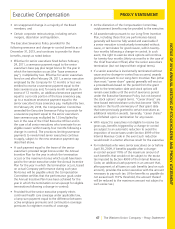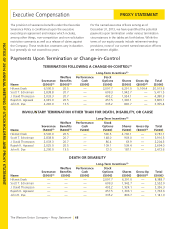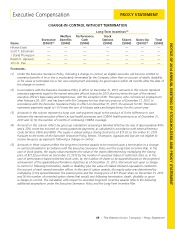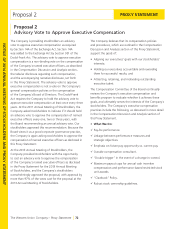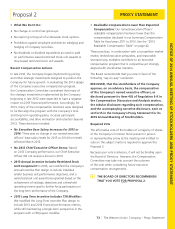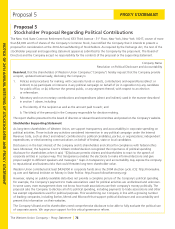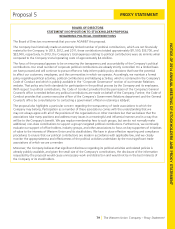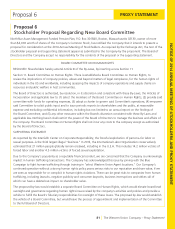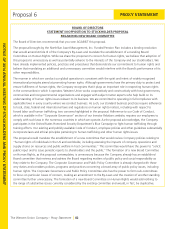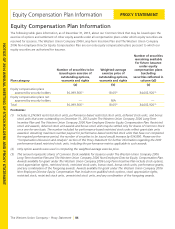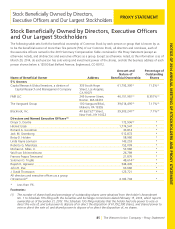Western Union 2013 Annual Report Download - page 94
Download and view the complete annual report
Please find page 94 of the 2013 Western Union annual report below. You can navigate through the pages in the report by either clicking on the pages listed below, or by using the keyword search tool below to find specific information within the annual report.
The Western Union Company – Proxy Statement | 76
Proposal 4 PROXY STATEMENT
NOTICE OF 2014 ANNUAL MEETING OF STOCKHOLDERS AND PROXY STATEMENT
BOARD OF DIRECTORS
STATEMENT IN OPPOSITION TO STOCKHOLDER PROPOSAL
REGARDING STOCKHOLDER ACTION BY WRITTEN CONSENT
The Board of Directors recommends that you vote AGAINST this proposal.
Western Union has demonstrated its commitment to principles of sound corporate governance, working to ensure
that its practices protect and further the interests of its stockholders. In recent years, the Company has, among other
initiatives, (i) commenced the declassification of its Board of Directors, ensuring that directors would be elected annually,
(ii) added a right for stockholders to call special meetings to the By-Laws, and (iii) adopted a “proxy access” right for its
stockholders. The Company also has a majority vote standard in uncontested director elections. With respect to actions
taken by the stockholders, Western Union’s current practices are designed to ensure that notice and an opportunity to be
heard precede stockholder votes, enabling meaningful discourse to occur before important decisions are made affecting
the Company. This proposal, by contrast, would enable the owners of a bare majority of shares to act by voting in favor
of their own proposed action, without ever providing notice to other stockholders or the Company.
Currently, any matter that Western Union or its stockholders wishes to present for a stockholder vote must be
presented at a meeting. This allows all stockholders to consider, discuss and vote on pending stockholder actions. In
contrast, the written consent proposal at issue would permit a group of stockholders with no fiduciary duties to other
stockholders to initiate action with no prior notice either to the other stockholders or to the Company and without
giving all stockholders an opportunity to participate and consider arguments, including those of the Company, for
and against the action to be considered at the meeting. Permitting stockholder action by written consent could also
lead to substantial confusion and disruption for stockholders, with potentially multiple, even conflicting, written
consents being solicited by multiple stockholder groups. In short, the Board does not believe that written consent is an
appropriate corporate governance model for a widely-held public company like Western Union.
The Company also believes that adoption of this proposal is unnecessary because of Western Union’s demonstrated
history of commitment to high standards of corporate governance. The proposal expressly mentions concerns about
stockholders being forced to wait until the Annual Meeting of Stockholders in order to take action or effect a change
in the Company, yet the Company has taken numerous steps that enable participation by stockholders. Western
Union’s By-Laws permit holders of at least 20% of the outstanding shares to call a special meeting of stockholders.
The Board believes that holding meetings with proper notice whereby all stockholders may deliberate and discuss the
proposed actions, receive and consider the Company’s position and recommendation, and then vote their shares is
the best way for stockholders to take action. The safeguards around the ability to act by a special or annual meeting
promote and protect stockholders’ interests.
Another concern alluded to in the proposal involves keeping the Board accountable to stockholders. Under our current
governance structures, however, our directors are already highly accountable to stockholders. Each of our directors
is elected by majority voting, and our Certificate of Incorporation and By-Laws have no supermajority provisions.
Additionally, the Company was among the first in the United States to adopt a “proxy access” By-Law amendment for
its stockholders. We believe that this comprehensive package of governance practices and policies, including the right
to call special meetings, enables stockholders to hold the Board accountable and, where necessary, take quick action
to support their interests. However, our policies implement those goals without the governance risk to stockholders
and the Company that would be associated with action by written consent as contemplated by the proposal.



